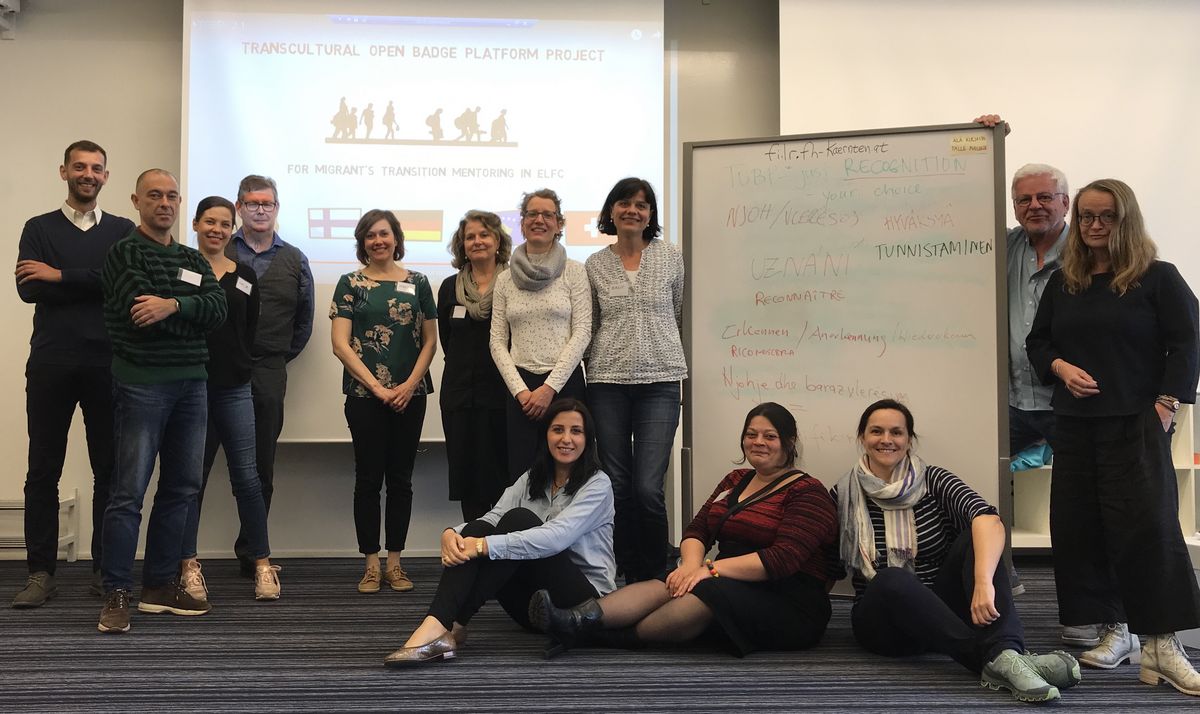International collaboration in higher education - A platform for validating foreign and informal qualifications

Filippo Bignami, you are leading a very interesting project called “TOBP - Transcultural open badges platform for migrant’s transition mentoring in early life family care” supported by Erasmus+ and Movetia. Could you tell us more about it?
The project TOBP aims at defining a set of tools for skill recognition for professionals working in the field definable as “transition mentoring”. Its aims are to create an open badge platform a) to enable the validation of foreign and informal qualifications and b) to provide education and training in the context of the newly developed job competence (and not professional profile) “transition mentor”.
The project wants to answer to the need of skills recognition for migrants. The recognition of qualifications obtained has been identified as a key challenge in Europe, and also in Switzerland this is an important topic. Migrants are unable to secure jobs because their knowledge, skills and competences are not validated in their host countries. Non-recognition of foreign qualifications and prior learning is one of the central migration issue of the new century in all post-industrial societies, as stated from UN in 2016.
The application of such a perspective allows a profound innovation in training and a reflection firstly on how to equip citizens (we need to bear in mind that migrants are citizens in socio-political and ethical senses) with the capacity to be aware of their potentiality. In a nutshell: it’s crucial understanding how to increase the competence of the social, political and economic power the dimension of citizenship (including rights and duties) implies to enable a performative citizenship approach, with a particular attention to frame it in the city setting, since the city is the key place where are emerging social, economic and political knots.
Why are funding programmes for cooperation projects in education essential in the face of global challenges?
The importance of these funds to participate in such projects is manifold. Just need to say that in our era of so deep and fast challenges and changes, where mega-trends such as urbanization, digitalization, environment danger and others, are unavoidable forefronts, is simply a non-sense try to close borders. It is a coarse answer to complex demands. Simply because goods, services and wealth are more and more “immaterial” and furthermore ideas, solutions and opportunities are immaterial, and to benefit from all these is necessary to cooperate, to innovate the society, to test paths, to connect and to share. It is necessary to explore and increase awareness about the concept of citizenship (to take advantages but also to share advantages) in a wide sense through education, and cooperate at European level in education seems not only convenient but wise for a country like Switzerland, that could not live just for one week standing alone in the geographical middle of Europe. Cooperate in education, and beyond, is hence indeed essential.
How did you build up the partnership with the other participating institutions from Austria, Finland, Germany and Kosovo? Any recommendations for how to proceed?
Due to a past Erasmus+ project I maintained fruitful contacts with the Austrian coordinator, with whom we also had a scientific cooperation. Once they planned to propose this project, then, was normal to involve me. As a recommendation I would say that is important to start explaining in a clear way to European partners that the participation of a Swiss partner as associate is not a problem for the project, but oppositely can be a plus. In several occasions I found some misunderstandings on Swiss participation conditions, and this is a bias to be cleared. Of course is also a matter of reputation of the partner, and sometimes of the person, but trying to be active in creating links and in keeping collaboration out of Switzerland is always a good means to open up enriching perspectives.
What is the benefit for SUPSI out of a Strategic Partnership?
The benefit, I think, is always to be seen as a bilateral process. Strategic partnership are project where usually partners are demanding and high level. So, if one think to participate in projects just benefitting one way, I think it’s a wrong way. In my experience, the more one is active and participate in co-construct output (offering benefit) the more one can receive benefit from participation (double way benefit). In this TOBP project case, SUPSI can benefit in sharing a method, innovate contents, explore a way that can be applied not only for benefitting SUPSI, but also to be casted to benefit all Swiss institutions and actors interested.
How satisfied are you with the support of Movetia in implementing the Strategic Partnership?
Movetia supports and helps effectively and efficiently not only in implementing but also in conveying tips and hints for project management and for project setting up. In particular those who have not a solid experience in Strategic partnership projects, in my opinion can find in Movetia a fully supportive point of reference.
This interview is part of a series of meetings with project leaders within the framework of strategic partnerships. Find more examples of cooperation.
Movetia supports cooperation
Swiss higher education institutions are eligible to cooperate in a strategic partnership project with European institutions via the Swiss Programme for Erasmus+ Key Action 2.
Strategic partnerships are an Erasmus+ project format. They facilitate European cooperation at all levels of education. The institutions involved work together to develop innovative concepts, methods and instruments, share good practices and utilise synergies. This helps improve quality and strengthen international networks.
Cooperation projects are generally funded through lump-sum grants for specific budget items. The subsidy amount depends on the project duration, the planned activities and the project type.
More Information
Strategic Partnerships in the field of Higher Education
Contact: Maria Stergiou